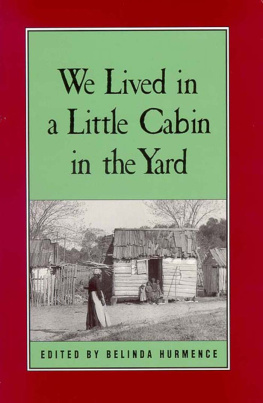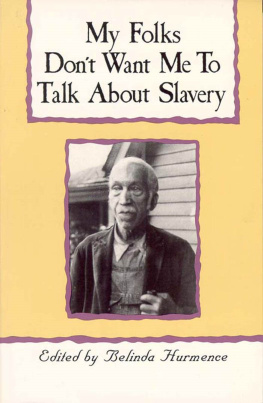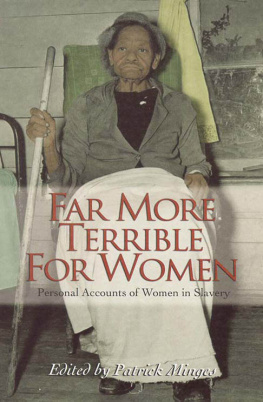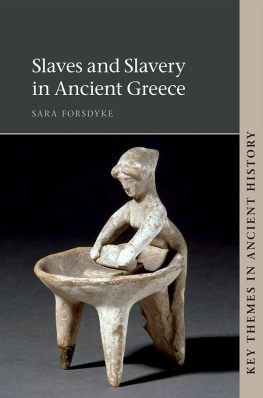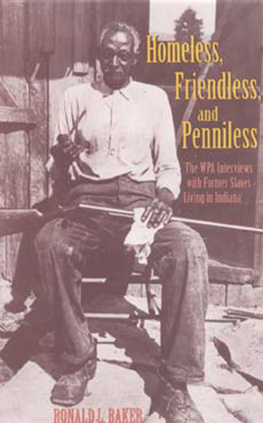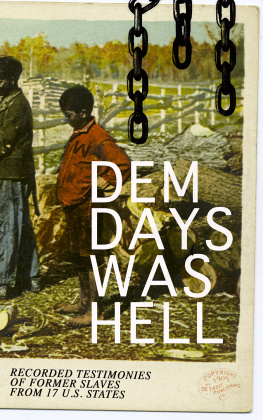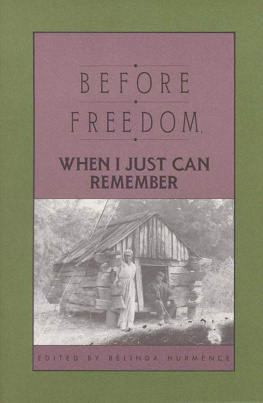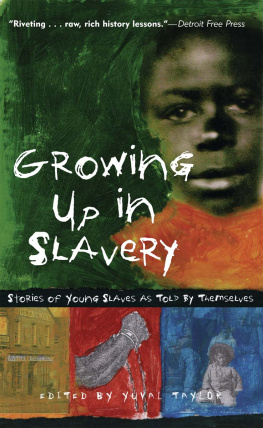We Lived
in a
Little
Cabin
in the Yard |
Other Books by Belinda Hurmence
FICTION
Tough Tiffany
A Girl Called Boy
Tancy
The Nightwalker
Dixie in the Big Pasture
NONFICTION
My Folks Dont Want Me to Talk about Slavery
Before Freedom, When I just Can Remember

Copyright 1994
by Belinda Hurmence
Printed in the
United States of America
All Rights Reserved
Eighth Printing 2006
DESIGN BY DEBRA LONG HAMPTON
Photograph on front cover:
From the Perm School Collection,
courtesy of Perm Center, Inc.,
St. Helena Island, South Carolina
The paper in this book meets the guidelines
for permanence and durability of the
Committee on Production Guidelines for
Book Longevity of the Council on Library Resources.
Library of Congress Cataloging-in-Publication Data
We lived in a little cabin in the yard / edited by Belinda Hurmence.
p. cm.
ISBN 0-89587-118-1 (acid-free paper)
1. SlavesVirginiaBiography. 2. SlaveryVirginia.
I. Hurmence, Belinda.
E444.W35 1994
305.5670922755dc20
[B] 9428622
For an uncommon daughter
of the commonwealth
Harriette Hodges Andrews
Many thanks to Carolyn Sakowski, who first suggested to me the idea of editing the Slave Narratives of Virginia for a general readership. Thanks also to my generous friend Keppel Hagerman, for sharing with me the last will and testament of her great-great-grandfather James Derring, whose document led me to the tone I hoped to set for this book, and ultimately to the title, We Lived in a Little Cabin in the Yard.
I am very much indebted to Conley L. Edwards, head of Archives Public Services Section in the Virginia State Library and Archives at Richmond, for his assistance in making available to me a number of folk histories from the WPA records, Virginia Writers Project, Life Histories, and for granting me permission to quote from those documents. The ex-slaves Baily Cunningham, Jane Pyatt, Robert Williams, and Martha Ziegler are quoted at length; brief comments are excerpted from the narratives of Archie Booker, Robert Ellett, Marriah Hines, and Louise Jones.
I also thank Michael Plunkett, director of special collections and curator of manuscripts at the University of Virginias Alderman Library, for his assistance in making available to me the folk history of Levi Pollard, WPA Collection #1547, and for granting me permission to quote from this document.
Finally, I thank Margie Wessels, Phalbe Henriksen, and Judy Clayton at the Iredell County Library in Statesville, North Carolina, who at all times help me work out knotty problems in connection with my research, and for whose assistance with this book I am especially grateful.
Susan Kelly, who lived her early life as a slave in Virginia, vouched for her former master. He was good to his slaves, she says in a 1938 interview. He never sold Mammy or us chilluns. He kept we alls together, and we lived in a little cabin in the yard.
Susans simple words speak a history that, over the years, has been tidied up for most Americans. History books tend to focus on the politics of slavery, or its economics, and tactfully skirt the human mechanics of that unseemly institution. In the same vein, historical fiction mainly presents a romanticized or stereotypical version of slave life. The firsthand experience of a Susan Kelly, eyewitness of day-to-day life under the yoke, offers a better seminar to readers who would inform themselves about the realities of slavery.
But how to learn the firsthand experience? Susan Kelly and her fellows in slavery are long gone. By law, slaves were kept illiterate, so there is scant possibility of some lost memoir of a slave novelist/historian surfacing at this late date. Would that we might come upon such a treasure.
Luckily, we possess the equivalent in the Library of Congress. A monumental trove it is, toosome twenty-two hundred testimonies of former slaves, collected as a make-work research and writing project back in the Great Depression of the 1930s, under the auspices of the Works Progress Administration.
The method the WPA devised for this project seems incredibly primitive to present-day scholars. Even elementary students, schooled in the operation of computers and electronic recording devices, may approach the gathering of oral history with aplomb. In the 1930s, workers assigned to collect the Slave Narratives, as the WPA project came to be designated, were simply provided a list of questions, to which they wrote out their subjects answers by hand. Later, they typed up their notes to fit a prescribed style.
In the state of Virginia, a few workers managed to capture the voices of some former slaves by the rudimentary recording then available to them. The idea was laudable; the recordings themselves are almost unintelligible, and so of limited value. Fortunately, typewritten text accompanied the technology of the time.
At the close of the WPA project, in which seventeen states participated, the Library of Congress organized the folk histories by state for deposit in its Rare Book and Special Collections Division. The breakdown of narratives ranges from a paltry 3 obtained in Kansas to the 677 narratives amassed by workers in Arkansas. Virginia contributed only 15.
The commonwealths participation was far greater than the 15 would appear to indicate. Virginias venerable Hampton Institute early assigned a zealous task force to the WPA project, and these workers continued interviewing for some months beyond termination of the federal initiative. The institute secured upwards of 300 records of former slaves. These accounts have since been published verbatim in works of immense benefit to historians and scholars.
The distinction between narratives collected specifically for the federal project and narratives gathered by Hampton as an independent undertaking is shadowyif any distinction exists at all. Nevertheless, I decided to restrict my editing of Virginia narratives to those contained in the WPA collection, as more in keeping with my prior workMy Folks Dont Want Me to Talk about Slavery (1984) and Before Freedom, When I Just Can Remember (1989), the former consisting of selections from the North Carolina Narratives and the latter a companion volume of South Carolina accounts.
However, not all of the fifteen Virginia histories met one or another of the standards which I wanted for We Lived in a Little Cabin in the Yard. My criterion of gender balance, for example. And of course, I wished to select for content as well as region, the latter meant to reveal the pervasive similarities of slave experience.
Above all, to reduce the risk of hearsay, I sought statements from those ex-slaves who had been eighty or older at the time of the WPA interviews. It seemed to me that these older ex-slaves more reliably told of vivid, personally observed events and customs, whereas the reminiscences of younger persons were often laced with the tales of acquaintances and kin but lacking in direct experience.
To prepare a representative number of the fifteen Virginia narratives for publication would have resulted in a woefully abbreviated volume, had I not hit upon the idea of extending my search for appropriate material throughout the other sixteen states in the WPA collection. Following this scheme, I have drawn nine accounts from the Alabama, Arkansas, Missouri, and Texas collections for use in Little Cabin. The nine constitute a unique group which I believe can rightfully be characterized as Virginia narratives. These are histories of Virginia-born slaves who had been relocated for various reasons: one sold south to another state and remaining there after Freedom, for instance; another hustled out of Virginia to prevent his escape with Union soldiers; and so on. The testimony of these transplanted slaves indicates that their experience of bondage relates primarily to Virginia, and for the purposes of
Next page
